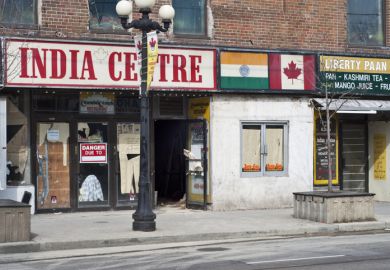India’s vice-president, Jagdeep Dhankhar, recently launched into an apparent tirade against students heading abroad for higher education. Speaking at an engineering college, he described going abroad as a “new disease” while lamenting the country’s “forex drain and brain drain” (“forex” being an abbreviation of “foreign exchange”).
Predictably enough, his statements generated substantial controversy. Some rightly pointed out that Indian students are heading abroad because of a lack of enough good quality higher education institutions at home. As Jairam Ramesh of the opposition Congress party put it: “Students going abroad is not the disease, it’s merely a symptom of a diseased education system.”
Others noted that the vice-president’s remarks were hypocritical. The education portal Careers360.com pointed out that Dhankhar’s daughter obtained her MBA from the University of Pennsylvania’s Wharton School of business, and it produced a list of serving or former ministers – notably finance minister Nirmala Sitharaman, foreign minister S. Jaishankar and defence minister Rajnath Singh – whose children also studied abroad.
The furore over the vice-president’s remarks is perhaps justified. To describe the aspiration of students to study abroad as a “new disease” is in bad taste. However, context always matters.
Dhankhar was not addressing well-educated, affluent, cosmopolitan kids from Delhi or Mumbai. He was talking to students in the small Indian town of Sikar in Rajasthan, 200 miles south-west of Delhi. In many such towns, people are often not sufficiently aware of what studying abroad entails.
In the same address, the vice-president pointed out that parents “lack counselling” and there is “no objective evaluation of which institution [their children] are enrolling in [or] which country they are going to”. He was also critical of “a mindless pursuit of foreign shores”.
In other words, his remarks were clearly directed specifically at poorly informed parents and students, who are not in a position to make the right choices about what or where to study, whether in India or abroad. Given the high financial costs, particularly of studying abroad, that is a big problem that does need to be addressed.
Many parents take out loans or even sell ancestral land or other assets to send their children abroad. Making the wrong choices, therefore, hurts the financial prospects and life chances of both students and their families.
A growing number of India’s college students are from small towns like Sikar. Most are not affluent. Many are first-generation students, for whom a college degree itself is a giant first step of hope. It is unfair to assume that these students, or their parents, have reliable information about courses and institutions just because they may have access to the internet.
While it is impossible to know the precise intent of the vice-president’s remarks, he appears to have been forcefully making the point that rather than blindly head abroad, students and parents should be helped to make better-informed choices. He was right to express concern that students are “influenced by advertisements” and to recommend that undergraduate institutions “make their students aware of the foreign conditions” and of the ranking and “status” of universities they are proposing to apply to (options include the world university rankings produced by organisations such as Times Higher Education).
Campus resources on internationalisation in higher education
Dhankhar is not the only prominent figure worried about the potential for poorly informed Indians to make the wrong choices around studying abroad. A few months ago, Indira Nooyi, the former chair and CEO of PepsiCo, released a video message in which she spoke about the challenges for Indian students heading to the US for higher studies.
Nooyi advised students to choose their “university and course carefully”, and, like Dhankhar, highlighted the “cultural sea change” that students would need to adapt to. No one took offence.
In sum, Dhankhar’s critics could perhaps have highlighted the sensible advice he gave to students, rather than focus entirely on his poor choice of words.
Pushkar is director of The International Centre Goa.
POSTSCRIPT:
Print headline: Judicious advice is crucial
Register to continue
Why register?
- Registration is free and only takes a moment
- Once registered, you can read 3 articles a month
- Sign up for our newsletter
Subscribe
Or subscribe for unlimited access to:
- Unlimited access to news, views, insights & reviews
- Digital editions
- Digital access to THE’s university and college rankings analysis
Already registered or a current subscriber?








